Is It Normal for a Refrigerator Compressor to Feel Cold to Touch? Understand Why
We may earn affiliate fees for purchases using our links (at no additional cost to you).
Is it normal for your refrigerator compressor to feel cold to the touch? Many of us have wondered about this phenomenon.
When we touch the refrigerator compressor, it feels cold. Why is that?
This article explores the temperature-influencing factors behind refrigerator compressors. Discover why your refrigerator compressor might feel cold as we unravel the mystery.
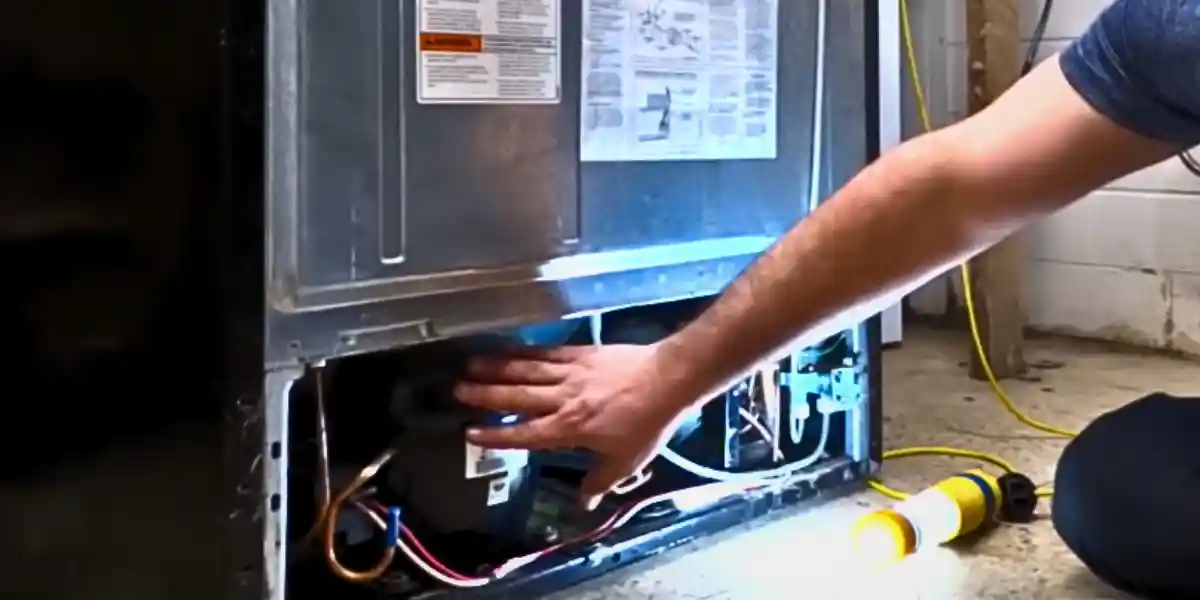
Is It Normal for a Refrigerator Compressor to Feel Cold to Touch?
Yes, it is normal for a refrigerator compressor to feel cold to the touch. The compressor’s function is to compress refrigerant, which generates heat.
This heat is expelled from the back or sides of the fridge, causing the compressor to feel cold.
Benefits of a Cold Refrigerator Compressor
A cold refrigerator compressor offers several advantages:
Improved Cooling Efficiency:
A cold refrigerator compressor facilitates better cooling performance. The compressor can absorb more heat from inside the refrigerator when it remains cool.
This results in faster and more efficient cooling of your food and beverages.
Energy Efficiency:
By maintaining a low temperature, the refrigerator compressor requires less energy to operate.
To achieve cooling, the compressor needs to run less hard when it’s cold. This helps reduce energy consumption, leading to cost savings on your electricity bill.
Extended Lifespan:
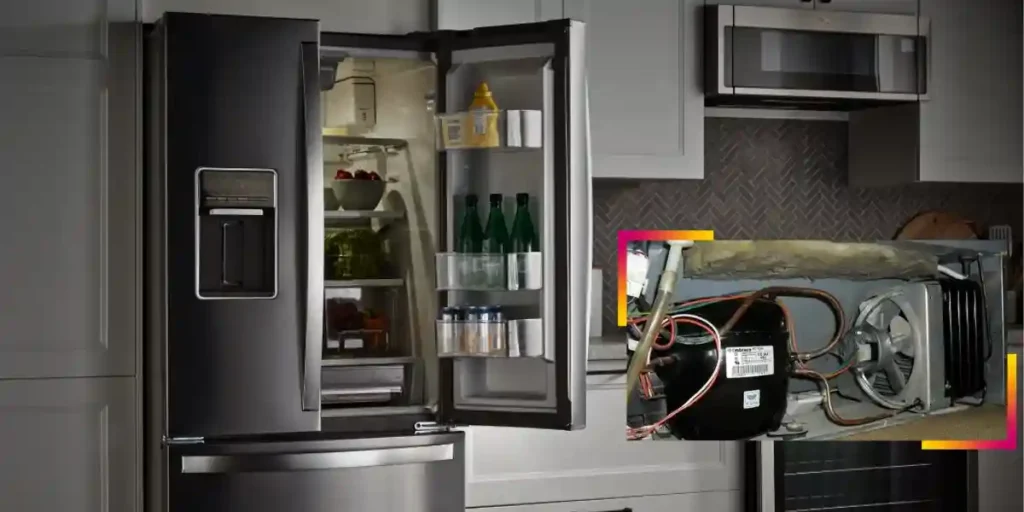
Refrigerators with cold compressors have less strain and stress during operation.
Optimal heat management minimizes overheating and premature wear and tear on the compressor.
You can potentially use your refrigerator for longer without having to replace it frequently.
Preservation of Food Quality:
The cold temperature of the compressor aids in preserving the freshness and quality of your stored food.
Perishable items remain safe by maintaining the proper temperature inside the refrigerator. This ensures that your food stays fresh for a longer duration.
Reduced Noise Levels:
When a compressor runs at a cooler temperature, it tends to produce less noise. As a result of the reduction in heat generation, your refrigerator can operate more quietly.
The refrigerator should be located in an area that is frequently used, such as the kitchen.
Factors Influencing the Temperature of a Refrigerator Compressor
The factors affecting the temperature of a refrigerator compressor include the following:
Ambient Temperature:
The surrounding temperature affects the refrigerator compressor temperature.
As a compressor works harder to dissipate heat at higher temperatures, it will become warmer.
On the other hand, cooler ambient temperatures can lead to a colder compressor.
Cooling System Efficiency:
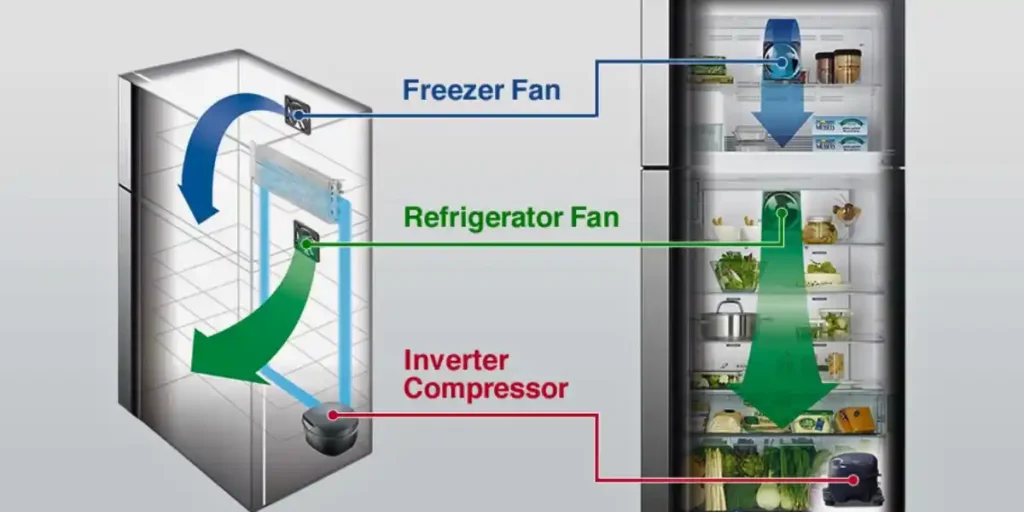
The efficiency of the refrigerator’s cooling system affects the temperature of the compressor.
A well-maintained cooling system with clean condenser coils. Improved airflow allows heat dissipation, keeping compressor temperatures within range.
Compressor Size and Design:
The size and design of the compressor itself can influence its temperature.
Different compressors may have varying cooling capabilities and heat dissipation mechanisms.
Smaller compressors run warmer than large compressors with robust cooling systems.
Refrigerant Type and Charge:
The type and amount of refrigerant used in the system can impact compressor temperature.
Each refrigerant has specific properties that affect its cooling efficiency. The compressor may overheat or not cool sufficiently if the refrigerant charge is improper or excessive.
Compressor Load:
The workload on the compressor affects its temperature. Refrigerators that have been left open with warm food or a heavily loaded compressor.
It will generate more heat, causing the compressor to become warmer.
Maintenance and Cleanliness:
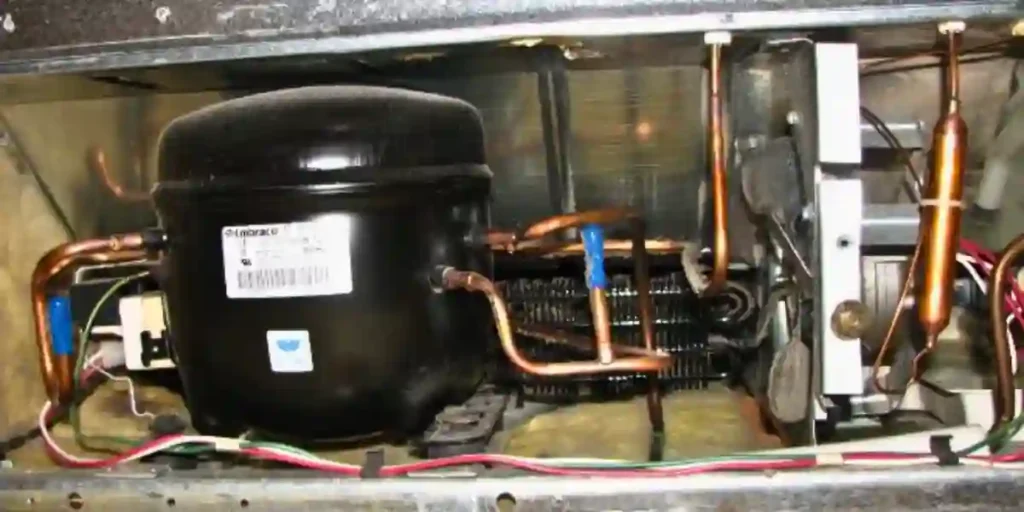
The refrigerator compressor temperature needs to be maintained regularly and kept clean.
A dirty condenser coil may interfere with heat dissipation, resulting in a hot compressor.
Proper cleaning and maintenance help ensure efficient cooling and temperature control.
Refrigerator Age and Condition:
The age and overall condition of the refrigerator can impact compressor temperature.
A warmer compressor may result from refrigerators with worn-out components or older models.
Safety Considerations When Touching a Refrigerator Compressor
The following are safety considerations that should be taken when dealing with refrigeration compressors.
Risk of Burns:
Refrigerator compressors can become extremely hot during operation. Touching a hot compressor can result in burns to your skin.
It is important to avoid direct contact with the compressor to prevent injury.
Electric Shock Hazard:
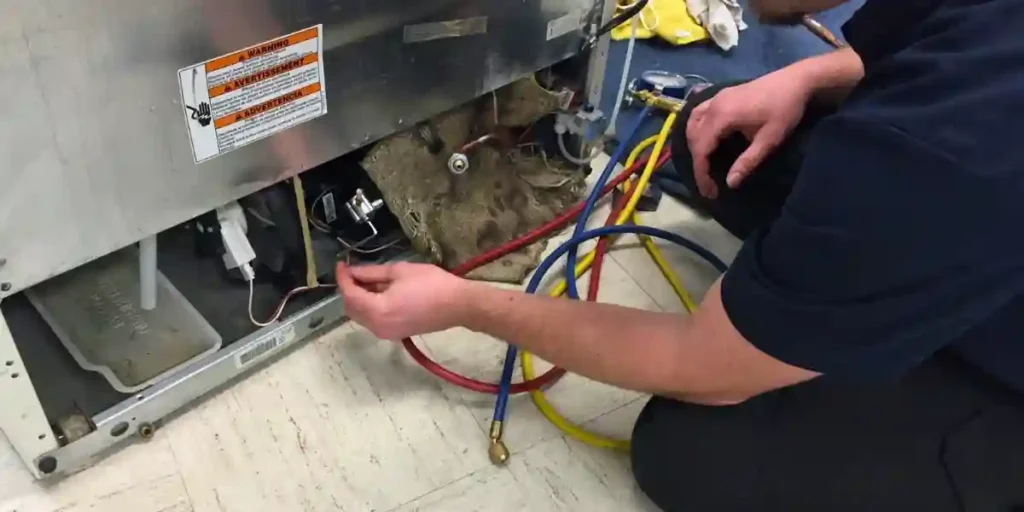
Refrigerators are connected to electrical power sources. Electrical shock could occur if the compressor’s electrical components malfunction or are damaged.
When you suspect an electrical issue with your refrigerator, avoid touching the compressor.
Moving Parts:
Refrigerator compressors contain moving parts, such as the motor and fan. These parts can be hazardous if they come into contact with your hands or fingers.
Avoid touching or inserting objects into the compressor area to prevent accidental injuries.
System Pressure:
Refrigerator compressors operate under high pressure to circulate refrigerant.
Touching or tampering with the compressor can release refrigerant, which can be harmful.
Leave any maintenance or repairs involving the compressor to trained professionals.
Refrigerant Leak:
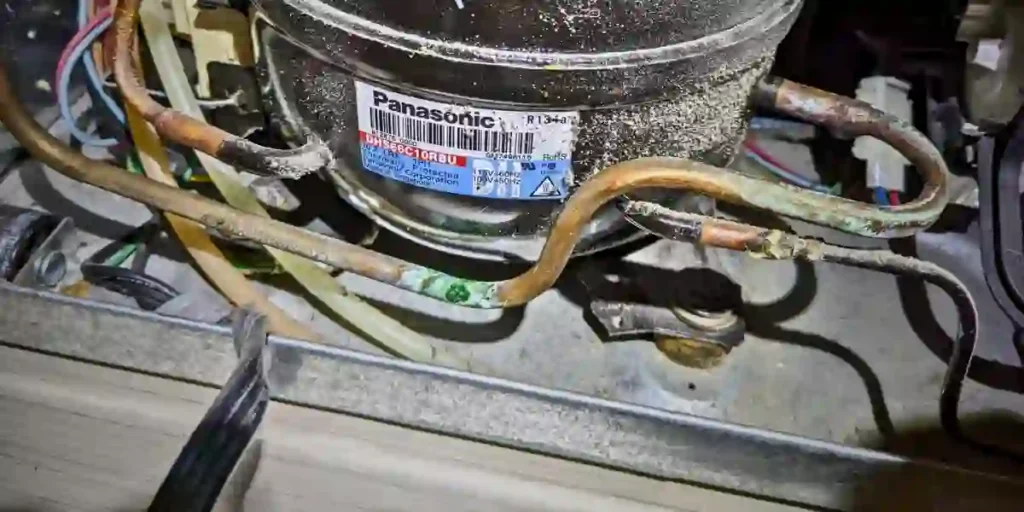
Refrigerant leaks can occur in the compressor or other parts of the refrigeration system.
Some refrigerants are toxic or flammable, posing health and safety risks. You should evacuate the area immediately if you smell refrigerant or suspect a leak.
Proper Maintenance:
Maintaining your refrigerator regularly is essential for safe operation. Make sure that the compressor is clean and free of debris, as this can affect its performance.
Follow manufacturer guidelines and consult professionals for maintenance or repairs.
Manufacturer’s Instructions:
Refer to the manufacturer’s instructions and safety guidelines for your refrigerator.
Guidelines for safe operation, maintenance, and troubleshooting are provided. Compressors and other components can be safer when following these instructions.
Maintaining the Optimal Performance of a Refrigerator Compressor
In order to maintain an optimal level of performance, you will need to perform a set of maintenance tasks.
Clean the Condenser Coils:
Regularly clean the condenser coils located either at the back or underneath your refrigerator.
A buildup of dust and debris can reduce heat dissipation, increasing compressor temperatures. Use a vacuum or a brush to gently remove the dirt from the coils.
Ensure Proper Airflow:
Maintain adequate airflow around the refrigerator to prevent overheating of the compressor.
Avoid placing items directly against the back or sides of the refrigerator, as this can restrict airflow.
Leave some space between the refrigerator and the wall to allow for proper ventilation.
Check the Door Seals:

Inspect the door seals or gaskets for any signs of wear or damage. Warm air can enter the refrigerator through damaged seals, causing the compressor to work harder.
Clean the seals regularly and replace them if necessary to ensure a tight seal.
Set the Right Temperature:
Keep the refrigerator temperature at the recommended level. Low temperatures can strain compressors, while high temperatures can affect food preservation.
Refer to the manufacturer’s guidelines for the optimal temperature range and adjust accordingly.
Avoid Overloading:
You shouldn’t overload the refrigerator with excessive items, as this impedes airflow.
Properly distribute the contents inside the refrigerator to allow for efficient cooling and airflow.
Defrost Regularly:
If your refrigerator has a freezer compartment, regularly defrost it to prevent excessive ice buildup.
Ice accumulation can restrict airflow and hinder cooling efficiency. Follow the manufacturer’s instructions for defrosting or use the defrost function if available.
Handle with Care:
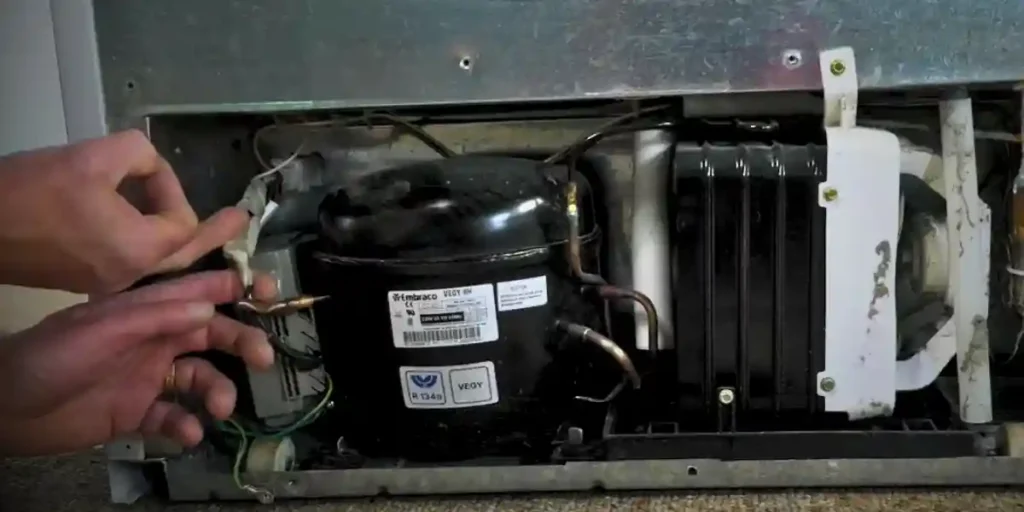
Carefully handle the compressor and its surrounding components when cleaning or maintaining.
Do not forcefully bend or damage any parts as this can reduce performance and lifespan.
Schedule Professional Maintenance:
Schedule professional maintenance for your refrigerator, including compressor inspection and cleaning.
Technicians can identify potential problems, repair them, and ensure optimal performance.
FAQs About Refrigerator Compressors and Cold Temperatures
Can I Touch The Refrigerator Compressor Without Getting Burned?
To prevent burns or injuries, avoid direct contact with the compressor during normal operation.
Does A Cold Compressor Mean My Refrigerator Is Working Well?
The heat generated in the compression process is effectively dissipated if the compressor is cold.
What If My Refrigerator Compressor Is Hot Instead Of Cold?
Dirty condenser coils, restricted airflow, or a malfunction might account for a hot compressor.
It is recommended to have a qualified technician assess and address the problem.
Are There Any Safety Risks Associated With Touching A Cold Refrigerator Compressor?
For instance, there is still a risk of electric shock if there are electrical issues within the appliance.
Moving parts within the compressor area can pose a hazard if touched or tampered with.
Therefore, it is best to exercise caution and avoid direct contact with the compressor.
Conclusion
Refrigerator compressors remain cool to the touch, ensuring energy efficiency. Its design keeps heat dissipation efficient, preventing unnecessary warmth in your kitchen.
A cool compressor allows you to enjoy a refreshing fridge while saving on energy bills. Stay cool and efficient with a refrigerator equipped with a cold-touch compressor.